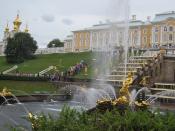Industrialization has been a key factor in the development of nations worldwide. Like every movement, industrialization is followed by both positive and negative effects. The industrialization of Russia was no exception to this theory.
In 1861, under the rule of Alexander II, Russia moved into an active period of social and political reform that established the base for industrialization. It wasn't until the 1890's that Russia finally entered the industrial age. This was due, in part, to the fact that earlier czars feared losing the support of the nobles so they avoided reform. The nobility strongly opposed industrialization because it would provide oppurunities for workers to leave behind the tyrannical rule of the nobility, trading in their pitchforks for a ticket to the city. Between 1890 and 1900 workers who would have been otherwise been handpicking crops for next to nothing served to triple Russia's production of coal, iron, steel and oil.
There were problems with Russian industrialization right from the start. As industry in Russia expanded, serfs were being sent to work in the factories. At first, this seemed to be a good thing. Afterall, the serfs were being given the opportunity to work apart from the land of their masters. However, the serfs were able to keep very little of the money they obtained from working in the factories. Much, if not all of their pay was given to their master. Russian serfs, who made up the majority of factory workers, were forced to continue living in poverty. It wasn't until later on that serfs were able to wriggle free from their masters iron fisted rule. This serves as an example of just one of the negative effects of Russian Industrialization.
In 1904, Russia was defeated in a war against Japan. The loss stirred feelings of frustration created...



Russian
I thoguht this was a well written essay, though it was short.
No conclusion but i do see an introduction.
Some of your points could have been expanded but well done.
3 out of 3 people found this comment useful.